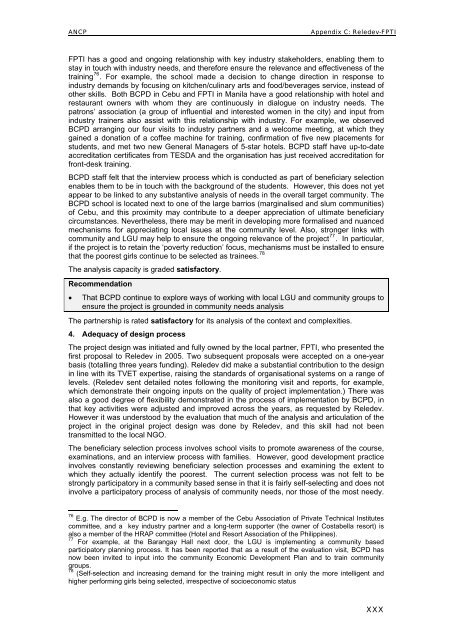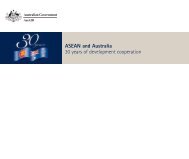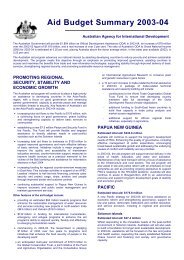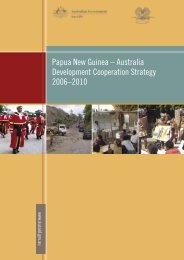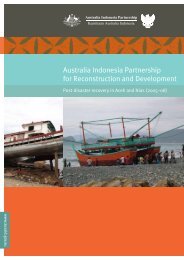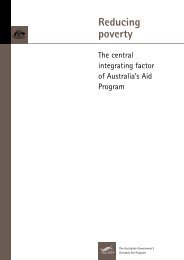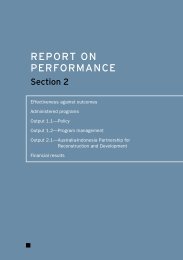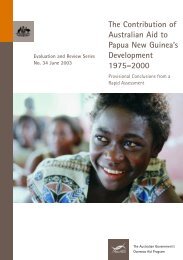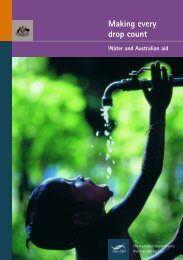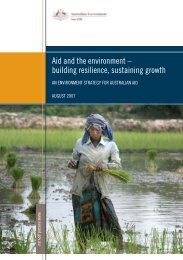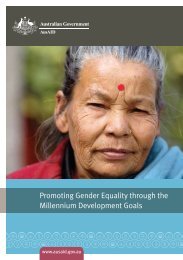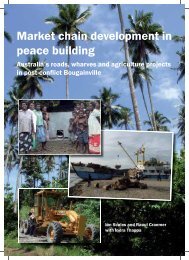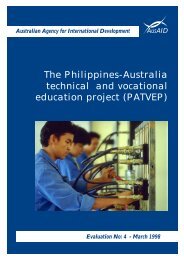ANCP Philippines Cluster Evaluation Report - AusAID
ANCP Philippines Cluster Evaluation Report - AusAID
ANCP Philippines Cluster Evaluation Report - AusAID
Create successful ePaper yourself
Turn your PDF publications into a flip-book with our unique Google optimized e-Paper software.
<strong>ANCP</strong>Appendix C: Reledev-FPTIFPTI has a good and ongoing relationship with key industry stakeholders, enabling them tostay in touch with industry needs, and therefore ensure the relevance and effectiveness of thetraining 76 . For example, the school made a decision to change direction in response toindustry demands by focusing on kitchen/culinary arts and food/beverages service, instead ofother skills. Both BCPD in Cebu and FPTI in Manila have a good relationship with hotel andrestaurant owners with whom they are continuously in dialogue on industry needs. Thepatrons’ association (a group of influential and interested women in the city) and input fromindustry trainers also assist with this relationship with industry. For example, we observedBCPD arranging our four visits to industry partners and a welcome meeting, at which theygained a donation of a coffee machine for training, confirmation of five new placements forstudents, and met two new General Managers of 5-star hotels. BCPD staff have up-to-dateaccreditation certificates from TESDA and the organisation has just received accreditation forfront-desk training.BCPD staff felt that the interview process which is conducted as part of beneficiary selectionenables them to be in touch with the background of the students. However, this does not yetappear to be linked to any substantive analysis of needs in the overall target community. TheBCPD school is located next to one of the large barrios (marginalised and slum communities)of Cebu, and this proximity may contribute to a deeper appreciation of ultimate beneficiarycircumstances. Nevertheless, there may be merit in developing more formalised and nuancedmechanisms for appreciating local issues at the community level. Also, stronger links withcommunity and LGU may help to ensure the ongoing relevance of the project 77 . In particular,if the project is to retain the ‘poverty reduction’ focus, mechanisms must be installed to ensurethat the poorest girls continue to be selected as trainees. 78The analysis capacity is graded satisfactory.Recommendation• That BCPD continue to explore ways of working with local LGU and community groups toensure the project is grounded in community needs analysisThe partnership is rated satisfactory for its analysis of the context and complexities.4. Adequacy of design processThe project design was initiated and fully owned by the local partner, FPTI, who presented thefirst proposal to Reledev in 2005. Two subsequent proposals were accepted on a one-yearbasis (totalling three years funding). Reledev did make a substantial contribution to the designin line with its TVET expertise, raising the standards of organisational systems on a range oflevels. (Reledev sent detailed notes following the monitoring visit and reports, for example,which demonstrate their ongoing inputs on the quality of project implementation.) There wasalso a good degree of flexibility demonstrated in the process of implementation by BCPD, inthat key activities were adjusted and improved across the years, as requested by Reledev.However it was understood by the evaluation that much of the analysis and articulation of theproject in the original project design was done by Reledev, and this skill had not beentransmitted to the local NGO.The beneficiary selection process involves school visits to promote awareness of the course,examinations, and an interview process with families. However, good development practiceinvolves constantly reviewing beneficiary selection processes and examining the extent towhich they actually identify the poorest. The current selection process was not felt to bestrongly participatory in a community based sense in that it is fairly self-selecting and does notinvolve a participatory process of analysis of community needs, nor those of the most needy.76 E.g. The director of BCPD is now a member of the Cebu Association of Private Technical Institutescommittee, and a key industry partner and a long-term supporter (the owner of Costabella resort) isalso a member of the HRAP committee (Hotel and Resort Association of the <strong>Philippines</strong>).77 For example, at the Barangay Hall next door, the LGU is implementing a community basedparticipatory planning process. It has been reported that as a result of the evaluation visit, BCPD hasnow been invited to input into the community Economic Development Plan and to train communitygroups.78 (Self-selection and increasing demand for the training might result in only the more intelligent andhigher performing girls being selected, irrespective of socioeconomic status<strong>ANCP</strong> <strong>Philippines</strong> <strong>Cluster</strong> <strong>Evaluation</strong> <strong>Report</strong> (ver. 2.0)XXX


